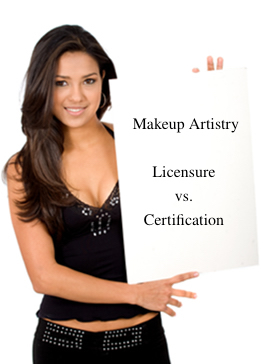Let’s clear the air!
What is the difference between makeup artistry licensure and certification, and what does it mean for an aspiring makeup artist?

As a makeup artistry instructor, I get this question often, “Once I complete a pro makeup course, where can I work with my certificate and does the state board control what I do with my new skill?” The debate about this topic can at times get very heated because it is a subject that is not well defined for many people or by state laws governed by state boards of cosmetology. Having a good understanding of the difference between licensure and certification and how each state and country governs or regulates this industry is very important to any aspiring makeup artist.
Let’s start with licensure and certification definitions and what they mean.
Licensure:
-
: the granting of licenses especially to practice a profession; also: the state of being licensed
- : the state or condition of having a license granted by official or legal authority to perform practices and procedures not permitted by persons without such a license
Certification:
- : the act of certifying: the state of being certified
- : a certified statement of completion
Okay now, how helpful was that? Not very helpful at all right? So what really is the difference and what does it mean to your career as a makeup artist?
Licensure
Fact, if you want to work in a salon or spa environment you will need to get licensed as a cosmetologist or esthetician to perform makeup artistry services on clients. Yes, these places are regulated by the state laws governing salons, spas, barbers shops, etc. So working in one of these environments means you will need to go to a state board approved school and complete the hours required to sit for a state board exam in the field of study you have chosen and you must pass this exam and pay all the fees required to obtain your licensure. There is no way around these laws and they are in place to protect you as well as the clients who receive their services within these locations.
So what does that mean for the aspiring makeup artist who just wants to do makeup? I think we all agree getting licensed gives you instant credibility so you should consider going to school and get licensure but if this is not an option for you then you can attend a school of makeup artistry and acquire a certificate of completion. Yes, once again a confusing aspect of this very confusing topic because there is no certification for makeup artistry only a certificate of completion, known in the industry as makeup artistry certification. These schools are not governed by state laws and regulations because by law they are not required to track hours nor are you required to take any state testing or receive state certification.
This is getting confusing right?
Certification
Fact, there are some great schools teaching makeup artistry including many cosmetology schools, esthetic schools, and beauty schools where you can acquire a certificate of completion, by the way, you can also work in the field of makeup artistry without a certificate but you really have no credibility in the industry if you haven’t gotten some sort of formal training. Just another fact you need to know!
Completing formal training will help you become familiar with makeup techniques and the proper application of products. It will also help you to get into a leading salon company like Salon Lofts company. If it’s a good school you will learn the history of makeup, best practices, safety and sanitation, as well as color theory, facial structure and then, of course, many forms of makeup applications. When you have taken all of the requirements they will give you a final exam and practical and once you have passed these you will be issued your certificate of completion.
What can you do with your certificate? Well, here is a compiled a list of career opportunities for freelance makeup artists in this article career opportunities for aspiring makeup artists. You will be able to work independently using the skills you have learned in your course and if allowable in your state or country you can charge for these services. You will need to do your homework for each state and know the laws governing makeup artistry.
I know this article will not clear up the controversy surrounding this topic but the truth is there are thousands of makeup artists worldwide who do makeup every day and make a great living using their skills and most are not licensed, cosmetologists or estheticians. If you don't believe me google your favorite makeup artist and see if he or she holds licensure, certification or perhaps neither. What you find may surprise you!

Your article helped me a lot, is there any more related content? Thanks!
Thanks for sharing. I read many of your blog posts, cool, your blog is very good.
generic viagra usa pharmacy: buy dapoxetine online pharmacy – pharmacy india cialis